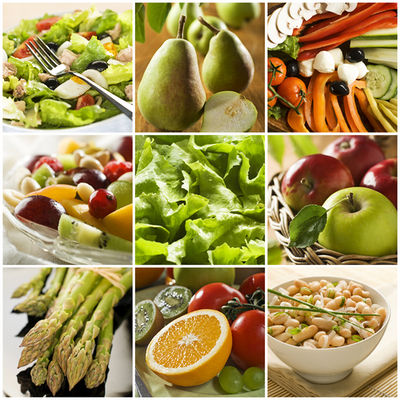Clinical Nutrition
| See Also | Naturopathic Therapies |
|---|
Clinical Nutrition or nutritional medicine consists of the use of diet and nutritional supplementation as therapeutic modalities.[1] Proper nutrition and digestion has been associated with the maintenance of health since the beginning of time.[2] Nutrients are the foundation of the human body, they can stimulate healing or contribute to disease - depending on the degree that a person's diet is suited to their age, constitution, as well as the season and environment in which they live.[1]
Contents
Classifications of Food
There are a number of different ways that food is classified. Each way represents a specific philosophy or approach to health. The quality of food is a growing concern, mainly due to food adulteration and contamination issues, the impact of herbicides and pesticides and genetically modified food. The quality of food is often discussed based on whether or not food is processed or whole food and whether or not it is organic or local and seasonal.
Traditional
In traditional systems of medicine food was often looked at based on its properties, such as hot or cold and dry or moist. Specific foods were chosen based on their ability to balance the body. This look at food is often referred to a the energetic properties of food.
Food Groupings
Eating a healthy diet involves consuming a balance of fruits, vegetables, grains, eggs, legumes, nuts and seeds, fish and meat and fats and oils on a daily basis. As part of a health diet it is often beneficial to monitor your consumption of dairy, sugar and salt.
Nutrient Composition
The nutrient composition of food looks at food from a biochemical perspective and explores the main components in food such as Carbohydrates, Protein, Fats or Lipids, Dietary Fiber, Water, Vitamins, Minerals and Enzymes. Nutrients in food are either considered macronutrients or micronutrients depending on the quantity in which they are consumed.
Non-Nutrient Components
Over time the study of food has expanded to include those non-nutrient components that are added to food during procssing such as food additives, food flavourings and food colourings.[3] These additives may provide flavour, colour and texture to food, but they also contribute to various symptoms and diseases.
Sugar and sugar-based products are often considered a non-nutrient component of food.
Characteristics
Looking at food based on its characteristics is based partly on the principles of the energetics of food. It includes:
- Plant family: Many foods are also considered herbs, spices or medicinal plants, for example onion, garlic, thyme, oregano etc.
- Food Properties: The main food properties include: sweet, sour, salty, spicy and bitter.
- Colour: The colour of fruits and vegetables indicated the different vitamins and minerals that they contain.
- Texture:
- Temperature:
Dietary Recommendations
Although there are key dietary recommendations utilized by naturopathic physicians, the practice of naturopathic medicine does not subscribe to any one particular diet regimen. The specific dietary recommendations that are suited for each individual depends on their current health status and the treatment objectives that are desired. It is always best to work with a naturopathic doctor before modifying your current dietary regimen.
| Article | The Food for Mood Diet, NDNR, 2011 April |
|---|
- Acid-Alkaline Diet
- Blood Type Diets
- Cruciferous
- Elimination Diet
- Energetic Properties of Food
- Feingold Diet
- Fermented Foods
- Food Challenge
- Food Combining
- Goitregenic Foods
- Ketogenic Diet
- Low Fat Diet
- Low Glycemic Diet
- Low Salt Diet
- Macrobiotic Diet
- Mediterranean Diet
- Nightshades
- Oligoantigenic Diet
- Ornish Diet
- Oxalate Diet
- Paleolithic Diet
- Pritikin Diet
- Portfolio Diet
- Purine Diet
- Vegetarian Diet
Reactions to Food
Whether or not individual foods are beneficial for a person depends on their reaction to the food. There are different types of food reaction or sensitivities each one reflecting a different response in the body. The main types of food sensitivies include:
References
- ↑ 1.0 1.1 Pizzorno Joseph, Murray Michael (1993) Textbook of Natural Medicine e-dition: Text with continually updated online reference, 2-volume set Churchill Livingstone
- ↑ Murray Michael (1996) Encyclopedia of Nutritional Supplements, The Essential Guide for Improving Your Health Naturally. California, Prima Publishing
- ↑ wikipedia reference
